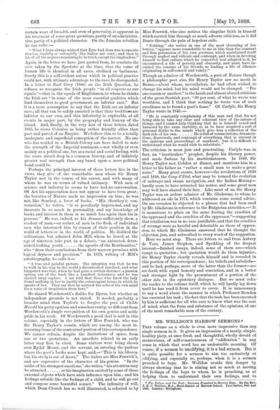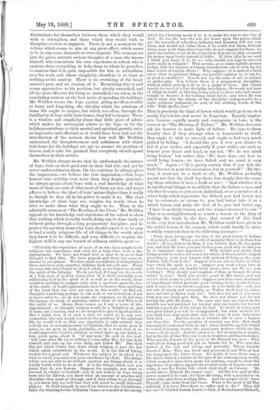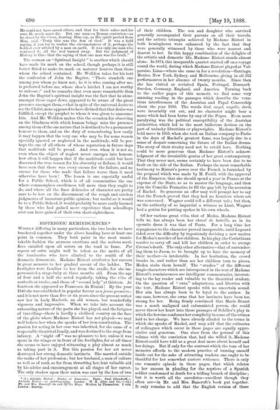MR. WELLDON'S HARROW SERMONS.*
THIS volume as a whole is even more impressive than an single sermon in it. It gives an impression of a manly, simple,, healthy piety, at once fresh and thoughtful, wholly devoid of mannerisms, of self-consciousness, of " edification " in any sense in which that word has an undesirable meaning. Of course, if a sermon be unedifying, it is a bad sermon. But it,
is quite possible for a sermon to aim too exclusively at edifying, and especially so, perhaps, when it is a sermon preached to boys. Mr. Welldon avoids this danger by always showing that he is aiming not so much at moving the feelings of the boys to whom he is preaching, as at helping them to understand their own feelings, and to
• The Future and the Past, SermonsPreachsd to Harrow Boys. By the Rev.. I. E. C. Welldon, M.A., Head-Master of Harrow School. First Series, 1585 and 1886. London : Rivingtone.
discriminate for themselves between those which they would wish to strengthen, and those which they would wish to discipline or even to suppress. There is not a sermon in the volume which seems to aim at any great effect, which seems to be in any sense dramatic or over-eloquent. The sermons are just the grave, natural, serious thoughts of a man who knows himself, who remembers his own experience at school, who is anxious above everything to help those to whom he preaches, so qmxious that it is quite impossible for him to attitudinise over his work, and whose simplicity, therefore, is at least as striking as his anxiety. There is no overdoing of the head- master's part, and no evasion of it. Everything that is said seems appropriate to his position, but utterly unstudied, and all the more effective for being so unstudied,—as when, in the concluding sermon on the best mode of spending the holidays, Mr. Welldon warns the boys against giving needless trouble at home and forgetting the chivalry which the relations of home life ought to inspire, but which, too often, through the familiarity of boys with their homes, they fail to inspire. There is a wisdom and simplicity about that little piece of advice which makes the subsequent advice to the boys to let the holidays contribute to their mental and spiritual growth, twice as impressive and effectual as it would have been had not the introduction of the sermon shown how well Mr. Welldon
understood the thoughtlessness and selfishness with which lads home for the holidays are apt to assume the position of
heroes, and to take for granted that everybody should spend themselves in their service.
Mr. Welldon always shows that he understands the nature of boys, both on their good and on their bad side, and yet he never under-estimates them. On the contrary, he always gives the impression,—we believe the true impression,—that boys honour true nobility even more than they despise pretence : he always speaks about boys with a real knowledge of what most of them are and of what most of them are not, and never affects to believe the ideal of boys' nature higher than it really is, though he does all in his power to make it so. His clear knowledge of what boys are, weights his words when he tries to make them what they ought to be. Thus, in the admirable sermon on "The Bearing of the Cross," Mr. Welldon appeals to the knowledge and experience of the school to show that nothing which is really worth doing can be done easily or without going through a long preparatory discipline, and he pushes the question home why boys should expect it to be easy to lead a really religious life, of all things in the world, when they know it to be difficult, and very difficult, to acquire the highest skill in any one branch of ordinary athletic sport :—
"Probably the experience of most of us who have sought to be religious has sometimes, and even for a long time, been a dis- appointment. We have not found God so near to us as we had thought to find Him. We have prayed, and there has come no answer to our prayer. We have made resolutions of living higher lives, and have seen ourselves drifting back into old sins. When we come into this Chapel we do not catch, as we hoped we should, the spirit of the Liturgy. We do not feel, if I may use the words of a holy man of modern times, that 'if a whole assembly were addressing God in the spirit of it as well as in the words, there would be nothing to compare with such a spectacle upon the face of the earth ; it would approximate more to heaven than anything of the kind that was ever yet seen in this world ;' we find our thoughts wandering perhaps to our work or our recreation, if not to baser subjects ; we do not make the responses, we do not sing the hymns, we think of anything rather than of God Who is in the midst of us. Hence there comes, as I say, a sense of dis- appointment; we thought religion would be a delight to us, and it turns out a burden, and we are tempted to give it up altogether. But I think that, if at such a time we could go to any wise counsellor, who was deeply versed in the problems of the spiritual life, he would tell us that our experience is only natural, that nobody can be instantaneously a Christian, that we must grow in grace, as we grow in body, gradually, or, in a word, that, if we would appreciate Christ's religion, we must make up our minds to take great pains about it. If any man,' He said in the text, will come after Me (or is willing to come after Me), let him deny himself, and take up his cross daily, and follow Me.' But then this law which Christ lays down about religion is just the law which exists everywhere in the world. It is the law of taking trouble for a great end. Whatever the subject be in which you wish to excel, you must win your excellence by effort. The things which you are able to do without exertion are things which it is hardly worth while to do at all. It is the things which cost you pains that do you honour. Suppose, for example, you want to succeed in cricket or football : you do not believe in boys being born into the Eleven, you know what an amount of practice and discipline they must go through, and if they refuse to go through it, you know only too well that they will never be really first-rate players. St. Paul himself, in one of his letters to the Corinthians, takes the training for the Lathmia,n Games as a model of the energy
which the Christian needs if he is to make his way to the City of God. So, too, the boy who sets his heart upon the prizes which are the rewards of schoolboy industry and learning will not win them, and would not value them if he could win them, without doing more work than other boys who do not compete for them ; he must rise earlier, or sit in his room when they are at play, or spend his money upon books instead of trifles. If, then, this be so—and I think you know it to be so—why should you hope to succeed more easily in religion ? Why assume, as so many lightly assume to-day, that the highest of human benedictions can be won by the least severe of human efforts ? Why suppose—it is indeed a fatal error—that in spiritual things one person's opinion is, or can be, as good as another's ? You do not say the same of art or science or philosophy. You believe there is a preparatory discipline, without which nobody is fit to be a judge of them. But Christ taught the need of a like discipline in religion ; Ho would not hear of religious truth or blessing being given to those who had never sought to deserve it by working hard for it ; and when He was asked what was the nature of the discipline indispensable to a right religious judgment, he said, in the striking words of the text, Take up the cross."
That is precisely the kind of lesson which would go home to a. manly boy's heart, and never be forgotten. Equally impres- sive, because equally manly and courageous in tone, is the sermon on "The Blessing of Failure." Mr. Welldon does not ask his hearers to make light of failure. He says to them frankly that if they attempt what is honourable in itself, they ought to wish to succeed, and ought to feel very much pained by failing. "I should like you if ever you chance to fail of your wishes, and especially if your wishes are such as honour your heart and head, to say not, We do not mind being beaten,' but rather this, We have done our best to avoid being beaten ; we have failed, and we mind it very much." Again :—" It is pretty certain that if you fail, the fault lies not in your circumstances, but in yourself." (By-the- way, it need not be a fault at all; Mr. Welldon probably meant not that the fault lay there, but simply that the cause lay there, whether it were a fault or not.) "And whether it is in intellectual things or in athletic that the failure comes, and whether it comes to you as an individual, or as a member of a select body which represents the School, you had better not try to extenuate or excuse it ; you had better take it as a moral lesson, and make the best of it ; you had better say, I have been fairly beaten, and the winner deserved to win.' " That is so straightforward, so sound a lesson on the duty of looking the truth in the face, that counsel of this kind is the very best introduction Mr. Welldon could have given to the nobler lesson of the sermon, which could hardly be more worthily rendered than in the following passages :—
"First, then, let me say—for this is the great lesson of failure —It is God's will. What a world of meaning there is in those few words ! If you believe in Him, if you believe that He has made you, and that He loves you and desires your good, why should you be so impatient and impetuous ? Why should you think that things would be better, for you or for others, if they could be shaped according to your poor human will, instead of being as He, your Father, wills them to be ? Suppose you are not so clever as other boys—well, He made yen so. Suppose you work a long time at your lessons, and can hardly learn them—does not He see you working ? Why should you complain of Him, as though He were unjust to you ? Shall you receive good at His hands, and not receive what seems to you evil ? Suppose you have some drawback or impediment which prevents your shining in the world of boys, and, it may be. even throws a gloom on your daily life—will you not take it wisely and reverently, as Walter Scott took his lame- ness, and not as Byron took his ? God does not ask of you more than you can fairly give Him. He does not blame you for not having the gifts He denies. The man who had one talent in tho parable was not punished for having only one talent, but for not making a good use of the talent he had. No doubt in using your own poor talent you will be disappointed ; but what matters it ? you shall have done your duty, and the issue of your duty rests with God But the lesson of Christ's life is even a higher one than this. For the problem of eternity was this : How shall humanity be redeemed from its sin ? where shall the spell be found to waken in human hearts the passionate motives which are the sources of all good ? And the answer is : Not in majesty or might, but in the life of One Who was born in weakness, and had no home; Who was the Friend of the poor, as He Himself was poor ; Who went about doing good and got no thanks for it; Who won the hatred of the rich and strong and powerful ; Whose friends deserted Him ; Who was tried and persecuted, and Who at last was hung upon the bitter Cross. No doubt, if ever there was a life which seemed a failure in the eyes of the contemporary world, which seemed to have been spent for nothing, except to show the impotence of goodness against the serried ranks of human sin and crime, it was the Divine Life which shed itself on Calvary. He saved others, Himself He cannot save.' All His love and all Hie, power seemed to be vain; for there He hung, with a malefactor on either side, and these reviling Him. And the people cried, Save Thyself; come down from the Cross. What is the good of all Thy winistry, if it leave Thee there to suffer and to die ?' They did not see-0 blinded human hearts !—that, if He had saved Himself, He could not have saved others, and that for their sakes and for ours He needs must die. But one man—a Boman centurion—as he stood by the Cross, hearing Him cry, as His spirit parted from Him, said, 'Truly this was the Son of God.' It was a bold saying, if you try to realise the circumstances of it, perhaps the boldest ever uttered by a man on earth. It was only one man who ventured it; all the rest turned away. But the judgment of History is this : that the saying of that one man was the truth."
The sermon on "Spiritual Insight" is another which should have made its mark on the school, though perhaps it is still better fitted to make its mark on maturer hearers than those whom the school contained. Mr. Welldon takes for his text the confession of John the Baptist, "There standeth one among you whom ye know not ; he it is who, coming after me, is preferred before me, whose shoe's latchet I am not worthy to unloose ;" and he remarks that even more remarkable than John the Baptist's spiritual insight was the fact that he alone, amongst those eager Jews, appeared to be aware of the great presence amongst them,—that in spite of the universal desire to see the Christ, none appeared to have divined that that desire was fulfilled, except the prophet to whom it was given to announce him. And Mr. Welldon makes this the occasion for observing on the blindness with which human beings miss the presence among them of the one nature that is destined to be a permanent honour to them, and on the duty of remembering how easily it may happen that the very one who may be for some reason specially ignored or neglected in the multitude, will be per- haps the one of all others of whose reputation in future days that multitude will be proud. And even when it is not so, even when the object of neglect never emerges into honour, how often it will happen that if the multitude could but have discerned the true reason for his obscurity or failure, it would have seen that there was every excuse for the failure, and no excuse for those who made that failure worse than it need otherwise have been ! The lesson is one especially useful for a Public School, which is of all communities the one where commonplace excellences tell more than they ought to do, and where all the finer delicacies of character are pretty sure to be lost on the discernment of the rough and careless judgments of immature public opinion; but useful as it would be to a Public School, it would probably be more easily learned by those who had gained more experience than schoolboys ever can have gained of their own short-sightedness.




































 Previous page
Previous page